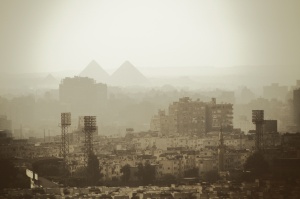Living
The first thing to do when moving abroad is to get out of the hotel and into a permanent place. Cairo is made up of many distinct neighborhoods. Some of them are friendlier to expats than others. Zamalek and Maadi are the most popular neighborhoods for foreigners and as a result are much more expensive. Some say it’s worth the expense. They are both quieter than other places and closer to many of the things you’ll need. Some of the best schools are there and the stores and restaurants that cater to expats. These are the places for tree-lined streets and pretty cafes.
Helipolis and Nasr City are close to Zamalek and Maadi in terms of comfort. The most expensive malls and restaurants

Cairo
are in these upscale neighborhoods. This is the home of the Egyptian upper class. You can find nice apartments for a nice price, but you are further away from the rest of Cairo.
If your budget is tight, you’ll have to look to other areas. Mohandaseen and Dokki are nearly as nice as Zamalek and Maadi, but noisier and cheaper. These locations are central and close to a lot of stores and restaurants. However, they are very, very busy. You will not have a quiet night. The same can be said of living Downtown. You have everything you need within reach, but you also have a lot of hustle and bustle.
The cheapest place to live would be Giza and the surrounding local neighborhoods. There are not many foreigners living here, so the prices are quite low. This also means that the apartments are not as modern as the other neighborhoods. Do not be surprised to see all manner of livestock and donkey carts outside your door. Your neighbors will be just as welcoming as in any other area and you can be sure they’ll keep a watchful eye on you. If you find yourself in such a local area, you will be living in Egypt as most Egyptians live.
Once you narrow down the neighborhood, you still have to find an actual apartment. The easiest way to do this is to find a building you like and ask the bowab, the building’s security man, if there are any free apartments. You could also employ the use of a simsar. A simsar is a person who will do the looking for you and show the places that suit your needs. The largest drawback to using a simsar is the fee that they charge when you sign a lease. Of course, you can always turn to the internet and start your search there. You will find both long-term and short-term leases in equal supply. Rent can be as low as 500LE in poorer neighborhoods and more than 5,000LE in the nicest ones.
Walking
Neighborhoods in Cairo are so dense that most of the things you need will be within walking distance. However, walking around can be uncomfortable for a lot of foreigners because you will find yourself stared at. Nonetheless, there are many ways to get where you need to go. Which one you choose depends on how far you want to go, how much you want to spend, and how comfortable you want to be. The cheapest options, and the best ones for short distances are tuk-tuks and microbuses. Taxis or the metro are the best bet for longer ones.
A tuk-tuk has three wheels and is very small. It can seat two people apart from the driver. They do not go very fast and are limited to certain parts of Cairo. You won’t find them on the main roads or in upscale areas. They are popular because they are so cheap. The average journey costs well under 10LE. You don’t need much Arabic to comfortably take one, just your destination. These are best for very short distances.
Microbuses are not for everybody, even though they are astoundingly cheap. For one, you have to learn basic hand signals for your destination to stop one, or at least have conversational Arabic. Microbuses are found all over the city, barring only the very upscale neighborhoods. For expats, it is better to use them for short distances, even though they are available for longer journeys. Most microbuses are very old and falling apart. It is normal to find them with doors ripped off and seats missing or nearly shredded. They are also always crowded. It is also normal to see fights break out over seats. Despite all of this, it’s not a bad idea for short journeys.
Taxis and the metro are the most common ways to get around for the expat community. The metro is very cheap, just 1LE, but its downfall is the limited number of lines available. There are only two lines, so it is often very crowded and you might end up taking a taxi anyway. Taxis come in two varieties in Cairo – black and white. Black taxis are older and often without a meter. White taxis are newer and with meters and air conditioning. They both have their drawbacks. With a black taxi, you have to know the fare and be prepared to argue for it. In a white taxi, you have to know the route. If you are unfamiliar with the roads of Cairo, you might find yourself being taken in circles to raise the fare. You also must keep an eye on the meter. If you look like a foreigner, the driver might change the rate on the meter. Normally, the meter increases 25 piastres at a time. Drivers might change it to 50 piastres in a bid to get more money from an unsuspecting foreigner.
Talking
If you are coming to Cairo as a language student, then you will have many opportunities to practice. Outside of the touristy areas and neighborhoods in Maadi or Zamalek, English is not widely spoken or understood. If you will be in an environment where you are exposed to a lot of Arabic, then you should be able to pick up enough to get by. If not, there are numerous language schools and private tutors. There is something for every budget. Just keep practicing what you’re learning. Any effort to communicate in Arabic is greatly appreciated.
Below are some helpful words and phrases.
Ana aiz… (m) / aiza… (f) – I want…; I need…
Kam keda? – How much is that?
…fayn? – Where is…?
Enta araf… (m) / enty arfa… (f) – Do you know…?
Low samaht (m) / low samahty (f) – please; excuse me
Shokran – thank you
Afwan – you’re welcome
Aiwa – yes
La – no
Working
Finding a job in Egypt mainly depends on word of mouth and who you know. There are various email lists and clubs you can join to make this easier, but the whole process is still a bit old-fashioned. Call the companies or businesses you are interested in and introduce yourself. Go out and pound the pavement with your CV. Make friends and talk to everyone who you think can help you. With a little luck, you will find a position.
Legally, you need a work visa to work in Egypt. In reality, no one will check. However, it is still a good idea to try and get a work visa, or at least a valid tourist visa. Work visas have to be done through your employer, but not all employers want to go through the process. If you are left to your own devices, you have to take a trip to the Mugamma and renew your entry visa. The Mugamma is an old, imposing building in Tahrir Square where thousands of people go everyday to straighten out various government problems.
Before you go to the Mugamma, make sure you have a few passport sized photos and a couple of copies of your passport. You can get the application to renew your visa when you’re there. The Mugamma is a maze. The section that controls visas is constantly crowded, so it’s best to go as early as possible. You will find yourself going from window to window and person to person until you find the right place. Once you have filled out the application and attached all appropriate copies and pictures, you will have to purchase stamps that show you have paid. The stamps are finicky and little and they must be handed over with your application and your passport. Then you just wait. If you are lucky, you will get your passport back with a new visa the same day. If not, you have to come back the next day.
Buying
You can’t live without shopping. At the very least you need to buy food and household supplies. In Cairo you can divide your shopping into weekly and monthly trips. In every neighborhood there are small markets where you can buy essential items like pasta, milk, bread, and so on. There are also specialty shops like a butcher, a bakery, and various fruit or vegetable stalls. These small stores can be a great bargain if you know the approximate prices. Sometimes, the proprietors see a foreigner and raise the prices exponentially. Know the prices and soon the shops in the neighborhood will know you. Once that happens, you will get the same prices as everyone else.
If you get homesick and want some items that remind you of your country, go to one of the bigger supermarkets. There is always one relatively close by and they are nearly the same as you would find in your country. Alfa Market, Metro, Carrefour, Seoudi, and Spinney’s have the best selection of goods. Everyday items cost a bit more here, so it’s best to leave those to the small markets. Plan to go to one of these stores at least once a month to stock up on items you have a hard time finding.
Living abroad is a tiring, but rewarding experience. You will see everything from a new perspective and have the luxury of being at home in two cultures, instead of one. Nevertheless, it takes a lot of work to start your life in a new place. An expat’s life in Cairo has its drawbacks, but also a lot of advantages. With a little research, any city could be your next home.

